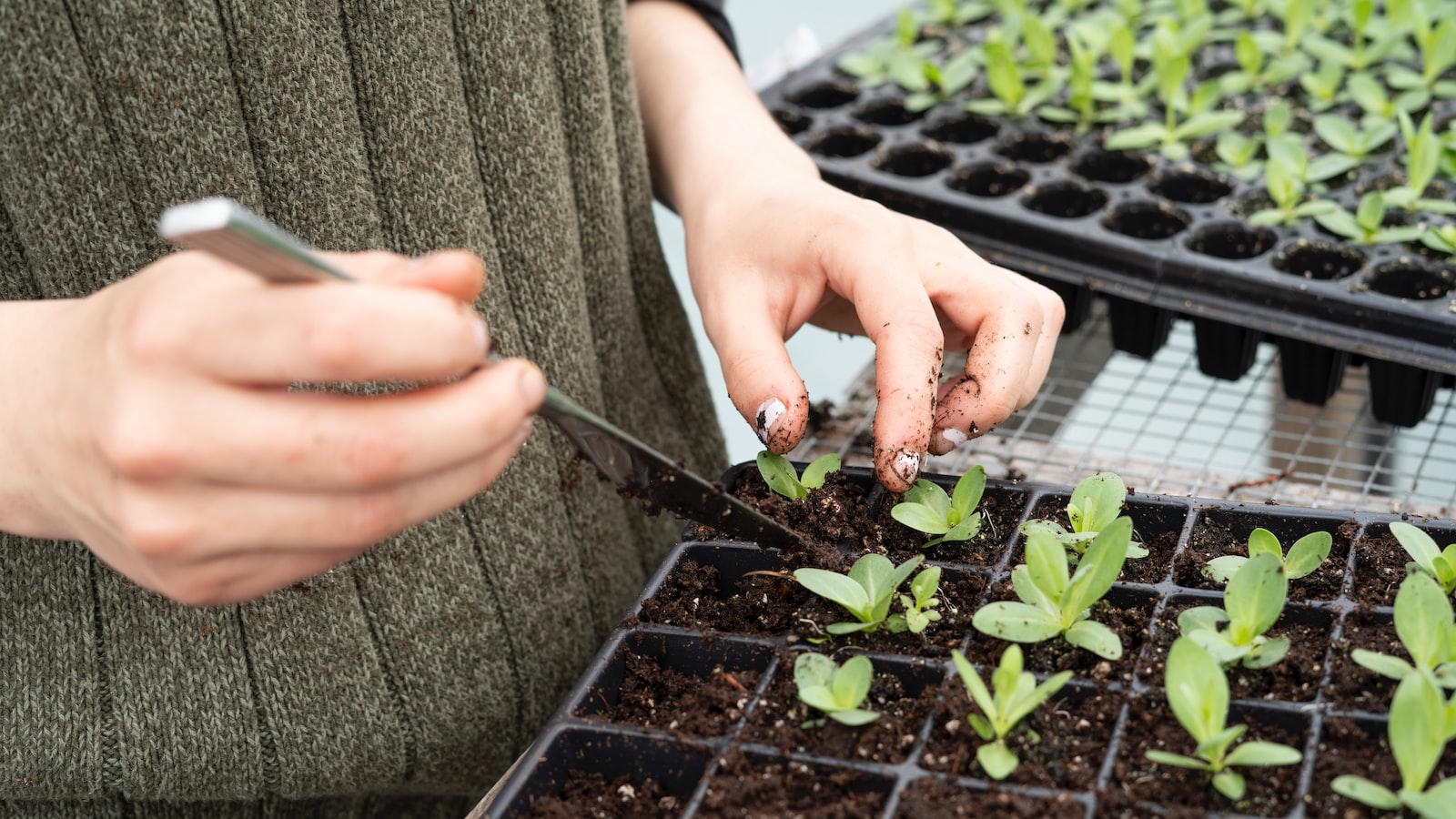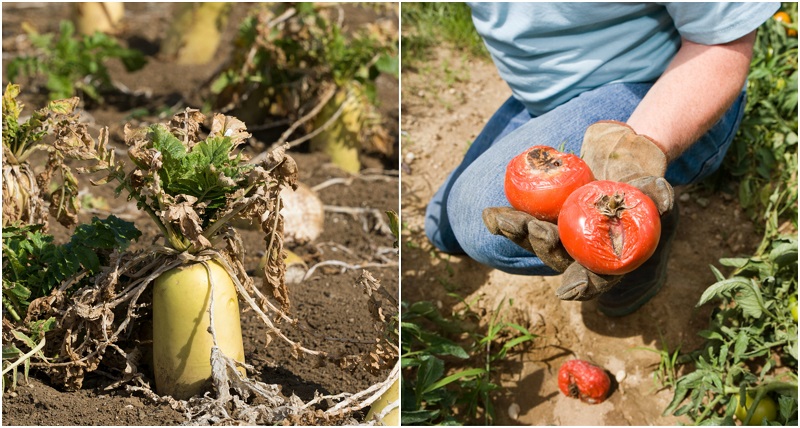In the verdant world of gardening, cultivating lush vegetable plants can be an endeavor that fills the heart with anticipation. Yet, sometimes, the dreamy vision of a bountiful harvest is met with disappointment and confusion when those sprightly green shoots refuse to thrive. Ah, the enigma that puzzles our green-thumbed souls… Why, oh why, aren’t my vegetable plants growing? As we delve into the intricacies of nature’s secrets, this whimsical exploration aims to uncover the mysteries that lie beneath the surface, shedding light on the possible reasons behind this befuddling predicament. Buckle up, fellow gardeners, as we embark on an enlightening journey in search of answers and solutions that will unravel the enigma of lackluster vegetable plant growth.
Stunted Growth: Possible Reasons why your Vegetable Plants are not Thriving
Are your vegetable plants refusing to grow? It can be frustrating and confusing, especially when you’ve put in so much effort and care. Don’t worry, though – we’re here to shed some light on the possible reasons behind their stunted growth. By identifying and addressing these issues, you can help your plants thrive and enjoy a bountiful harvest.
Poor Soil Quality
One of the leading causes of stunted growth in vegetable plants is poor soil quality. If your soil lacks essential nutrients or doesn’t drain properly, it can hinder the plant’s ability to take up water and nutrients. Ensure your soil has the necessary elements by enriching it with compost or organic matter.
Lack of Water
Water is an essential element for the growth of any plant. If your vegetables aren’t receiving enough water, they will struggle to grow and thrive. To ensure proper hydration, monitor your plants’ soil moisture levels and water them consistently but not excessively.
Inadequate Sunlight
Vegetable plants thrive under direct sunlight, and insufficient exposure to sunlight can stunt their growth. Make sure your plants receive at least 6-8 hours of direct sunlight per day. If your garden is shaded, consider using reflective materials or relocating your plants to sunnier spots.
| Features | Tips |
|---|---|
| Regularly test your soil pH. | Adjust the pH level based on the vegetable plants you’re growing. |
| Provide adequate space between plants. | This allows proper air circulation and prevents overcrowding, reducing the risk of diseases. |
| Apply organic mulch around plants. | Mulch helps conserve moisture, suppress weeds, and regulate soil temperature. |

Unlocking the Mystery: Understanding the Key Factors Affecting Vegetable Growth
Vegetable gardening can be a rewarding and fulfilling hobby, but it can also be frustrating when your plants just won’t seem to grow. Whether you’re a beginner or an experienced gardener, understanding the key factors that affect vegetable growth is essential for cultivating thriving plants.
One crucial aspect to consider is sunlight. Just like humans, vegetables need sunlight to thrive. Lack of sunlight can result in stunted growth and weak plants. When choosing a location for your vegetable garden, opt for an area that receives at least six hours of direct sunlight each day. If your garden is shaded, consider using reflective materials or strategically placing mirrors to redirect sunlight to your plants. Another option is to grow vegetables that tolerate shade, such as lettuce, spinach, or kale.
Another factor that significantly impacts vegetable growth is soil quality. Nutrient-rich soil is the key to robust plant development. Before planting, test your soil’s pH levels to ensure it falls within the ideal range for the specific vegetables you want to grow. Amend the soil with organic matter, such as compost or well-rotted manure, to improve its structure and fertility. Additionally, provide proper drainage to prevent waterlogged soil, which can suffocate roots and inhibit growth. Regularly mulching around your plants can help retain moisture, suppress weeds, and protect the soil from erosion.
Features/Tips:
| Key Feature or Tip | Description |
|---|---|
| Sufficient Watering | Ensure your plants receive consistent watering, keeping the soil moist but not saturated. |
| Proper Spacing | Give your vegetables room to grow by planting them at the recommended distances. Crowded plants can compete for resources and hinder growth. |
| Pest Control | Implement organic pest control methods such as companion planting, using natural repellents, or practicing regular inspection to keep destructive pests away from your vegetables. |
By understanding and addressing the key factors affecting vegetable growth, you’ll be well on your way to solving the mystery of why your plants aren’t growing. With the right amount of sunlight, nutrient-rich soil, and proper care, you’ll soon witness your vegetable garden flourishing with vibrant, healthy plants ready to deliver a bountiful harvest.
Transforming Troubles into Triumphs: Strategies for Nurturing your Vegetable Plants Back to Health
One of the most frustrating experiences for any vegetable gardener is seeing their beloved plants struggling to grow. Despite your best efforts, sometimes it feels like your thumb is anything but green. But fear not! In this post, we will explore effective strategies that can help you transform these troubles into triumphs, turning your languishing vegetable plants back into the picture of health.
To start, it is essential to identify the potential culprits behind stunted growth. Factors such as inadequate light, nutrient deficiencies, improper watering, and pest infestations can all contribute to the lackluster performance of your vegetable plants. By understanding these common issues, you can address them head-on and set your plants on the path to recovery.
Now, let’s delve into the transformative strategies that will nurture your vegetable plants back to health. Here are some features and tips to consider:
| Features/Tips | |
|---|---|
| Adequate sunlight | Ensure your plants receive at least 6 hours of sunlight each day. If natural light is limited, consider using grow lights to supplement. |
| Nutrient-rich soil | Use a well-balanced fertilizer or compost to provide the essential nutrients your plants need for healthy growth. Regularly amend the soil to maintain its fertility. |
| Proper watering | Avoid overwatering or underwatering your plants. Monitor the soil moisture levels and water them deeply when the top inch of soil feels dry. |
| Pest control | Keep a close eye on pests that can damage your plants. Implement organic pest control methods such as companion planting or using insecticidal soaps. |
| Pruning and training | Regularly trim and train your plants to encourage better airflow and adequate light penetration. This helps prevent diseases and promotes strong growth. |
| Regular monitoring | Observe your vegetable plants closely, watching for any signs of stress or disease. Catching problems early allows for prompt action and higher chances of success. |
By implementing these strategies and keeping a watchful eye on your vegetable plants, you’ll be well on your way to nurturing them back to their full potential. Remember, with a little patience, perseverance, and a sprinkle of gardening knowledge, you can turn those troubled plants into triumphant performers in your garden.
From Seedlings to Success: Expert Tips to Promote Growth in your Vegetable Garden
Are you scratching your head, wondering why your vegetable plants aren’t growing as well as you had hoped? Don’t worry, you’re not alone! Many gardeners face this dilemma, but with a little know-how and some expert tips, you can help promote growth in your vegetable garden and transform your seedlings into thriving success stories.
One important factor to consider is sunlight. Vegetables need an adequate amount of sunlight to grow and thrive. Ensure that your garden is in a location that receives at least 6-8 hours of direct sunlight each day. If your garden is shaded, consider pruning nearby trees or relocating your vegetable plants to a sunnier spot.
| Feature/Tips | Description |
|---|---|
| Proper watering | Make sure to provide your vegetable plants with consistent moisture, watering deeply but not excessively. Avoid letting the soil dry out completely, as this can stunt growth. |
| Fertilization | Regularly feed your vegetables with a balanced fertilizer to provide them with essential nutrients for growth. Follow the recommended application rates and timings for best results. |
| Pest control | Protect your vegetable plants from pests that can hinder their growth. Use organic pest control methods, such as companion planting and natural sprays, to keep unwanted critters at bay. |
Another crucial aspect is soil quality. Ensure that your vegetable garden has well-draining soil with a good balance of organic matter. Compost can be added to improve soil fertility and structure. Consider conducting a soil test to determine if any amendments are needed, such as adjusting the pH or increasing nutrient levels.
Frequently Asked Questions
Q: Why aren’t my vegetable plants growing?
A: Unraveling the Mystery of Stunted Greenery
Q: Are these plants just shy?
A: Exploring the Intricate Nature of Vegetable Shyness
Q: How can I nudge my veggies out of their shells?
A: Unveiling Secrets to Encourage Veggie Growth As we conclude our deep dive into the perplexing world of stunted vegetable plants, we must remember that Mother Nature holds an intricate tapestry of secrets, often unraveling them at her own mysterious pace. While we may find ourselves puzzled by the lackluster growth of our beloved green companions, it is crucial to approach this journey with patience and an open mind.
Every gardener embarks on a unique adventure, tending to seeds that promise to blossom into verdant wonders. Yet, this journey is not without its challenges, for growing vegetables is an art that demands hours of dedication and an understanding of the delicate balance between soil, water, sunlight, and the nurturing touch of human hands.
Our quest to uncover the reasons behind the reticent growth of your vegetable plants has presented an array of theories for us to ponder. From unyielding soil lacking vital nutrients to the harsh meddling of detrimental pests, a myriad of factors can thwart our aspirations of homegrown abundance. But fear not, dear reader, for these obstacles are but fleeting hurdles, and there is always light beyond the gloom.
As you face the many mysteries nature has in store, remember that knowledge is the gardener’s greatest ally. Educate yourself on soil composition, plant nutrition, and the signs that reveal a leaf’s secrets. Experiment with different techniques, explore the wonders of organic fertilizers, and embrace the guidance of seasoned gardeners who have traversed this path before.
Above all, let us not succumb to discouragement, for remember, even the mightiest oak was once a solitary acorn. Patience and perseverance will lead us to a bountiful harvest, where savory tomatoes, vibrant carrots, and overflowing baskets of lettuce will finally grace our tables.
So, fellow cultivators of green dreams, let us not be disheartened by the temporary setbacks we encounter on our journey. Instead, let them invigorate our curiosity and ignite the flames of our determination. With each passing season, we grow closer to unraveling nature’s secrets, coaxing vibrant sprouts from the earth, and delighting in the unparalleled joy of plucking a vegetable nurtured by our own hands.
In the hallowed realm of gardening, disappointment and triumph are intertwined in a delicate waltz. As we bid adieu, remember that failure is not synonymous with defeat; rather, it is merely a stepping stone towards growth and enlightenment. For it is through these setbacks that the tenacity of our green thumbs is sharpened, propelling us towards the triumphant symphony of flourishing vegetable plants that we envision.
- When to Put Weed and Feed on Lawn in Michigan - October 16, 2023
- When to Fertilize Potatoes Plants - October 16, 2023
- Can You Plant Clover in the Spring - October 16, 2023
Contents
- 1 Stunted Growth: Possible Reasons why your Vegetable Plants are not Thriving
- 2 Poor Soil Quality
- 3 Lack of Water
- 4 Inadequate Sunlight
- 5 Unlocking the Mystery: Understanding the Key Factors Affecting Vegetable Growth
- 6 Transforming Troubles into Triumphs: Strategies for Nurturing your Vegetable Plants Back to Health
- 7 From Seedlings to Success: Expert Tips to Promote Growth in your Vegetable Garden
- 8 Frequently Asked Questions

